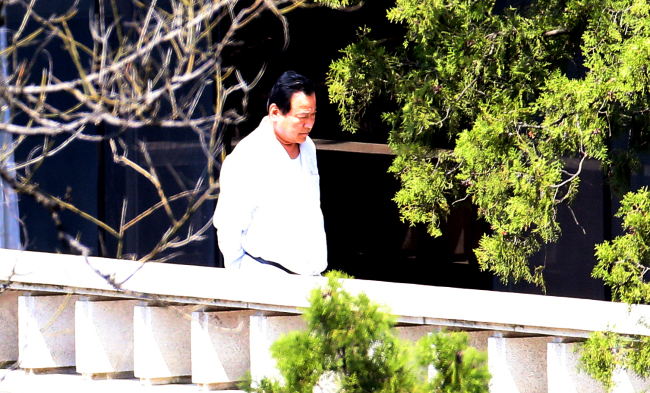Prime Minister Lee Wan-koo expressed his intention to resign late Monday over a spiraling graft scandal, leaving an administrative vacuum but providing a breather for the embattled ruling camp.
Lee’s resignation, still to be approved by President Park Geun-hye, who is on an overseas trip, is also expected to add momentum to the prosecutorial probe into allegations raised by a dead businessman.
Lee had faced intense media scrutiny and fiery criticism from the opposition for allegedly accepting illegal campaign funds worth 30 million won ($28,000) from former Keangnam Enterprises chairman Sung Woan-jong during Lee’s run in the April 2013 parliamentary by-elections.
Park is expected to decide on Lee’s resignation once she returns from a tour of Latin America on Monday.
Lee’s resignation, still to be approved by President Park Geun-hye, who is on an overseas trip, is also expected to add momentum to the prosecutorial probe into allegations raised by a dead businessman.
Lee had faced intense media scrutiny and fiery criticism from the opposition for allegedly accepting illegal campaign funds worth 30 million won ($28,000) from former Keangnam Enterprises chairman Sung Woan-jong during Lee’s run in the April 2013 parliamentary by-elections.
Park is expected to decide on Lee’s resignation once she returns from a tour of Latin America on Monday.

“It is regrettable. I understand this was a tough decision for the prime minister,” presidential spokesman Min Kyung-wook quoted Park as saying. “I urge officials to continue work as usual so that the (prime minister’s decision) does not interfere with our government’s operations.”
Park also pressed prosecutors in Seoul looking into related graft allegations to consider the case as “an opportunity to reform politics.”
Lee was among the eight pro-Park officials Sung named as accepting illegal funds from him. Sung was a construction mogul and an ex-lawmaker who was widely considered an active lobbyist in Seoul’s political circles.
Sung alleged having given money to the officials in an interview with a local daily hours before police found him dead on April 9 in an apparent suicide. Sung said in the interview that he had divulged his dealings to “cleanse the Park administration of corruption.”
Sung had been facing charges of swindling government money from authorities, which he denied. Sung had called the investigations against him a government-sponsored witch hunt, led by corrupt officials who had accepted unlisted campaign money from him since 2007.
Lee’s resignation is expected to ease the burden on the prosecution looking into the case, in which the government’s top officials are key suspects.
Concerns over the prosecution’s neutrality were also raised as the Prime Minister’s Office is directly above the Justice Ministry in the government’s chain of command.
On Tuesday, authorities summoned Sung’s former aide Park Joon-ho for questioning. Park is suspected to have information on if, how and when Sung had delivered the money to Lee.
“I have never personally seen anyone giving a box filled with cash to politicians,” he told reporters camped in front of the prosecutors’ office in Seoul.
The Kyunghyang Shinmun initially publicized Sung’s accusations on April 10, a day after Sung’s death.
It sparked public uproar here as the accusations indicated rampant corruption still haunting South Korea, a country that observers considered had come a long way since a civilian government grabbed power in 1992, ending decades of military dictatorship.
Partisan fighting surrounding the scandal will likely continue, parliamentary sources said, as the main opposition New Politics Alliance for Democracy is seeking to capitalize on Sung’s accusations in the April 29 parliamentary by-elections. The election will contest four legislative seats.
By Jeong Hunny (hj257@heraldcorp.com)
-
Articles by Korea Herald





![[Herald Interview] 'Amid aging population, Korea to invite more young professionals from overseas'](http://res.heraldm.com/phpwas/restmb_idxmake.php?idx=644&simg=/content/image/2024/04/24/20240424050844_0.jpg&u=20240424200058)












![[KH Explains] Korean shipbuilding stocks rally: Real growth or bubble?](http://res.heraldm.com/phpwas/restmb_idxmake.php?idx=652&simg=/content/image/2024/04/25/20240425050656_0.jpg&u=)

